This weekend, I had some spare time and I wondered which was the most popular reference manager (and how Docear is doing in comparison). So, I took a list of reference managers from Wikipedia, and checked some statistics on Alexa, Google Trends, and Google Keyword Planner. Since I had the data anyway, I thought I share it with you :-). Please note that this is a quick and dirty analysis. I cannot guarantee that there is not one or two reference managers missing (i just took the list from Wikipedia), and, of course, there are many alternatives to Alexa and Google for measuring the popularity of a reference manager.
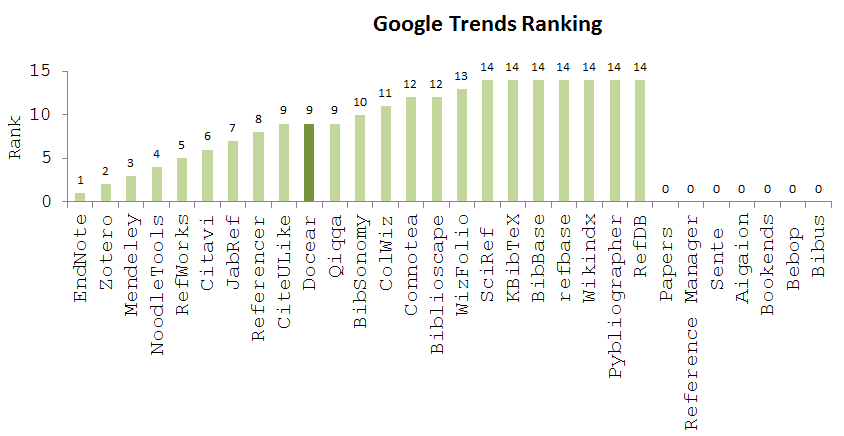
Data was exported from Google Trends, normalized, and that tool with the highest search volume since January 2012 was ranked #1. The tool with the second highest search volume was ranked #2, etc. Docear, CiteULike, and Qiqqa had the same search volume, hence they are all ranked #9. Papers, Sente, Reference Manager, etc. were not included because their product names are so generic.
Google Trends shows a picture most people would probably expect. Endnote, Zotero, and Mendeley are the most popular tools, i.e. they accumulate the highest search volume. It should be kept in mind that the true popularity of “Endnote” probably is a little bit lower, because some people searching for “Endote” might not be interested in the reference manager but in some information about endnotes in general. What is quite interesting is the high search volume for “NoodleTools”. To be honest, I wasn’t really aware of NoodleTools. While you permanently stumble upon Zotero, Endnote etc. when looking for reference managers, NoodleTools seems to be widely ignored by most reviews. Also Docear’s users typically use(d) e.g. Mendeley or Zotero but hardly anyone ever used NoodleTools before.
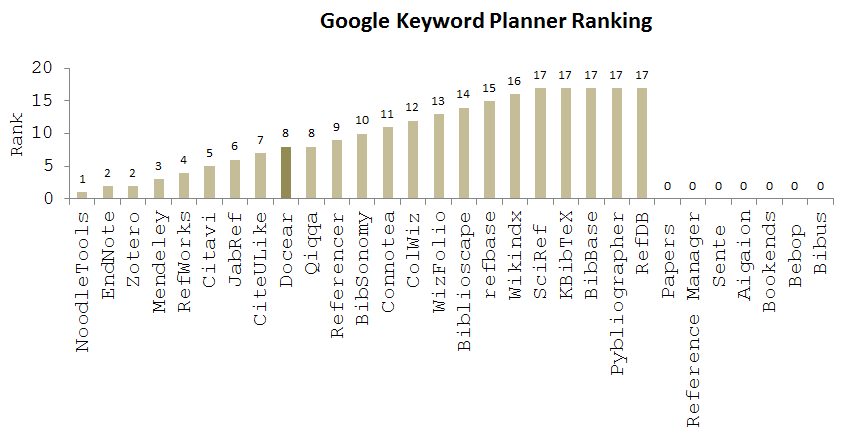
When using Google Keyword Planner, NoodleTools even has the highest search volume, followed by Endnote, Zotero, and Mendeley (don’t ask why Google Trends and Keyword Planner report different search volumes – I don’t know).
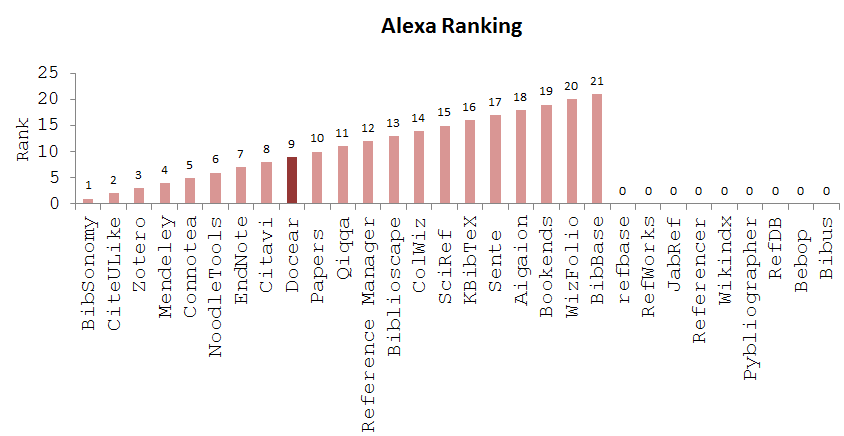
Alexa measures the number of visitors a website has and shows a different picture of the reference managers’ popularity than Google’s search volume. Bibsonomy and CiteULike rank first and second respectively, and the (discontinued) Connotea also ranks quite high (#5). Of course, these reference managers are all web-based. This means, users of e.g. Bibsonomy visit bibsonomy.org each time they use the tool. In contrast, users of e.g. Docear usually visit docear.org to download the software or get some support. Plausibly, traffic statistics of the web-based tools are higher. However, I find these numbers still surprising because they are so massively high for e.g. Bibsonomy, although the search volume is rather low. It’s also interesting to note that EndNote ranks only #7 while it ranked quite high according to search volume. RefBase, RefWorks, JabRef, Referencer, etc. have a ranking of 0 because Alexa did not provide any (reliable) data for them. The reason is that these tools don’t have their own domain but are hosted e.g. on Sourceforge, and Alexa only returns traffic statistics for the main domain, i.e. sourceforge.org instead of e.g. jabref.sourceforge.net.

On average, Zotero is the most popular reference manager, followed by EndNote and Mendeley (I just calculated the mean of the previous three rankings). Also popular are NoodleTools, RefWorks, and CiteULike. What makes me personally quite happy is the good ranking of Docear :-). According to all three ranking methods, Docear ranks #9 or even #8. I think that’s not bad given the rather small development team of Docear, and considering how young Docear is :-).

The above picture shows all three rankings in a single chart for an overall overview. The following pictures are all retrieved from Google Trends. They illustrate the fall and rise of some reference managers.

The search volume for Endnote continuously decreases. All other top-ranked tools rather gain popularity, although it seems that Zotero and Mendeley are “saturated”, according to search volume (of course, when the search volume remains constantly high, the tools still gain a remarkable number of new users every month). A little bit surprising is the high variation in the search volume for Noodletools and also RefWorks. I have no idea how this could be.

The search volume for Citavi slowly, but constantly, increased over the past years. In contrast, JabRef, Referencer, and CiteULike quite significantly lost popularity.
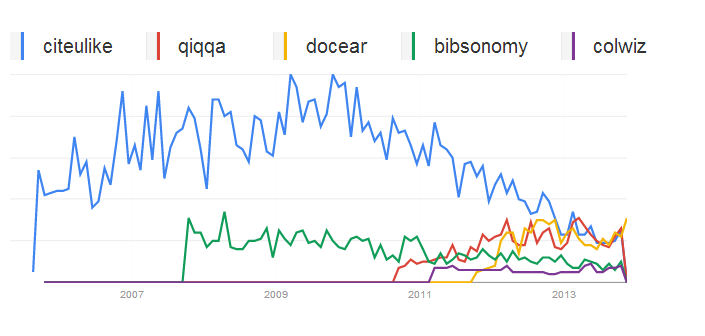
This chart shows data only from 2007 on because Google Trends simply did not export the other data (a bug?). In addition, you should ignore the very last bit of the chart – the search volume for Qiqqa certainly did not drop to zero, but Google Trends usually provides unreliable data for the current month.
The above picture shows even clearer how the interest in CiteULike decreases. While CiteULike once was far more popular than Docear, search volume for CiteULike and Docear is nowadays about the same. Bibsonomy and Colwiz have a comparable search volume (about half of Docear or CiteULike). However, for Colwiz the search volume remains constant over the years while for Bibsonomy it is decreasing.

It seems that around 2005, Biblioscape was quite popular but nowadays it’s hardly searched for any more. The search volume for Connotea is also constantly decreasing since its launch in 2005. So the consequence of the Connotea team to discontinue their service was probably quite rational. KBibTeX and Pybliographer’s search volume is close to zero (see chart above). Search volume for the remaining reference managers (WizFolie, RefBase, Wikindx, SciRef) is also close to zero (see chart below).

To give you an idea, about what dimensions we are talking …

… this is the search volume for Facebook and Linkedin, and…
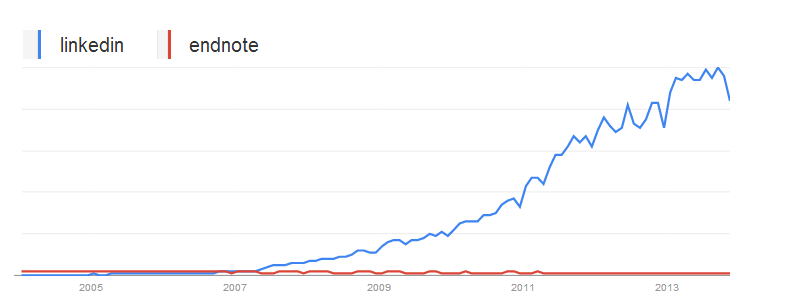
… this is the search volume for LinkedIn and Endnote. What does this mean? It means that the demand for reference managers is far far away from the demand of popular websites like Linkedin or even Facebook. Of course, the demand for reference managers will never become as high as for a social network such as Facebook. However, I believe that some day the demand becomes at least close to the demand for e.g. a professional network like Linkedin. From personal experience I know that there are many students and researchers who don’t use any reference manager at all (yes, they really do all the work manually, including formatting references e.g. in MS Word). So, there is still a lot of potential for the search volume to go up. To be more precise, based on Mendeley’s claim of having around 2.5 million users, we may estimate that there are around 10 or 15 million people who use reference managers overall (of course, this is a very rough estimate). Since there are about 100 Million students and researchers in the world, there are still some dozens of Millions to convince from the benefits of Docear & Co :-).


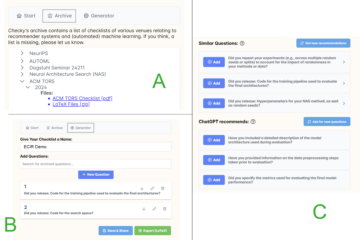
5 Comments
Duncan · 28th December 2015 at 13:08
Regarding:
“A little bit surprising is the high variation in the search volume for Noodletools and also RefWorks. I have no idea how this could be.”
I have seen simmilar cyclical volatile popularity patterns like that before co-inciting with stable release cycles of (non-rolling release) operating system distributions.
See popularity fluctuations on distrowatch.
Perhaps speculative adopters are taking advantage or trial periods – and then renewing trial periods rather than licensing.
Sometimes a blind eye is turned to retain dominant market share ensure “critical mass” of user-base.
– Duncan.
adam.smith · 11th November 2013 at 20:26
Fun!
RE: NoodleTools – like easybib, it’s heavily marketed towards highschoolers (“Integrated online tools to support authentic research and original writing in K-12 & upper education”) and pretty much unusable once you want to do serious academic work, that’s why you haven’t seen much of it. Since google trends only captures pretty inane one word searches, maybe high schoolers are more likely to use those?
RE: Online only tools: RefWorks, of course, is the big player in online only tools and it seems to be doing reasonably well, although there is a steady trickle of cancelled cite licenses (including by schools like Columbia that could definitely afford it). These tools are really attractive for places where many users use public computers (which would be another reason for the popularity of NoodleTools etc. in highschools)
I don’t think Zotero claims 2-3mil. users, btw. Last time Sean wrote about this,
http://quintessenceofham.org/2011/05/21/on-usage-figures/
all relevant numbers (except for downloads) were significantly below 1 million. There are likely 1-2mil. accounts now, maybe half of those are actually “users” but it’s really quite hard to know.
Joeran [Docear] · 11th November 2013 at 21:30
Thanks for the information. Actually, I was recapitulating the number of users from my memory. I thought that maybe two years ago I had read that both Mendeley and Zotero had around 1 or 1.5 million users. Recently, Mendeley announced 2.5M users, so I thought Zotero should have about the same number of users. Unfortunately, I cannot find the source where I read about Zotero’s 1-1.5M users. It might be that I was just wrong and confused some information :-). Anyway, I updated my post and removed the claim that Zotero has 2 or 3 million users. And I removed my conclusion that users are not interested in web-based reference managers. The success of RefWorks proves this conclusion to be inadequate, indeed ;-).
Dominic · 11th November 2013 at 15:55
I realise this post talks generally, about popularity.
However, for me personally, Docear is not quite a reference manager, it satisfies a slightly different requirement.
I use CiteULike as my reference manager, and Docear to organise my reading and mindmapping of the fields that I need to research. They work quite well in conjunction, with citeulike exporting to .bib files and Docear understanding .bib files.
Currently there are two issues with solely using Docear as my reference manager (which I’d like to do if/when these are sorted).
Docear is hugely reliant on the pdf files being present. Sometimes I just want to organise my collection of papers in a particular field (sometimes >100 papers) to see better where I should exert my reading efforts.
Also, Docear cannot webscrape, ie. extract metadata from journal websites or online archives of papers, such as arxiv. I realise this would require a seperate program, like a browser plugin to create .bib files for the imported papers which then get imported into Docear proper.
(On a side note, I used to use Mendeley for a while but their support of .bib files was incomplete at best and they sold out to Elsevier.)
Joeran [Docear] · 11th November 2013 at 16:07
Hi Dominic, thank you for your feedback. Would you mind telling me a little bit more in detail how you would want Docear to manage your papers when PDFs are not present? About the web-scrapper: We are aware of this shortcoming and we would really love to develop such a browser add-on. However, there are two reasons why this probably won’t happen in the next few months. First, this would require a massive amount of work (and maintenance), and second, we do not really have the expertise for developing browser add-ons. Anyway, hopefully next year we will have time for this.